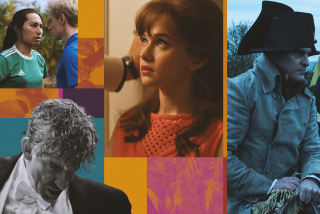Two Films Display the Serious Side of Percy Adlon
âThe Films of Percy Adlonâ continues Wednesday at 7:30 p.m. at UCLAâs Melnitz Theater with the 44-minute documentary âThe Dancer Heinz Boslâ (1975) and the 1982 feature âFive Last Days.â Together, they reveal a deeply serious side to the director best known for the delightful comedies âSugar Babyâ and âBagdad Cafe.â
When Adlon filmed Bosl for one of the series of 15-minute interview-portraits the director made for Bavarian television in the early â70s, he had no idea that the dancer was only eight months from his death at 28 from bone cancer; quite possibly, Bosl did not know either, for his mother decided that he should not be told he was fatally ill. To commemorate the first anniversary of the dancerâs death, Adlon augmented his original portrait with more footage of the dancer in performance and with interviews of those closest to him.
You do not have to be a balletomane to realize that the tall, gentle-looking Bosl was a dancer of extraordinary grace, a man who combined a formidable, seemingly effortless technique with great strength. His youth, dedication, unpretentiousness, sense of humor and dazzling talent make him a poignant, heart-breaking figure. His partners, including Margot Fonteyn, adored and admired him; his fiancee, the vibrant Margot Werner, a character dancer, who tries to console herself by saying âHe was spared growing old in a career for young people.â
It hardly seems possible to tell a story, a true one in this instance, of Nazi Germany that seems fresh but Adlon succeeds. Although there have been several films dealing with the resistance against Nazism within Germany, none is quite like âFive Last Days.â âDocudramaâ perhaps best describes this picture, a rigorously understated account of the fate of a young student, played by âThe Nasty Girlâsâ Lena Stolze, who is arrested and detained by the Gestapo. Stolze also played the same young woman in âThe White Rose.â
What is striking, in Adlonâs film, is the kindness with which Stolze is treated, both by her captors and especially by a fellow prisoner, a brave and caring middle-aged woman (Irm Hermann, a Fassbinder favorite in a rare major role).
Quite demanding on account of its appropriately unvarying low-key tone, it is disquieting on a couple of counts; first, as a depiction of the bureaucratic mentality as a source of evil. Also, the decent treatment Stolzeâs student receives while awaiting whatever fate holds in store for her reminds us inescapably of how differently concentration camp prisoners were being treated at that very same time, which was early 1943.
For more information about the Adlon series, which is co-sponsored by the UCLA Film and Television Archive and the Goethe Institute: (213) 206-FILM, (213) 854-0993.
The UCLA Film and Television Archiveâs fourth annual Festival of Preservation presents Thursday at 7 p.m. in Melnitz Theater two landmark Swedish films: Victor Sjostromâs âThe Phantom Chariotâ (1921) and Mauritz Stillerâs âErotikonâ (1920).
Based on a novel by the Nobel Prize-winning Selma Lagerlof, the first is a preachy fable about the evils of drink redeemed by complex flashbacks and stunning visuals in which Deathâs coachman appears, making his interminable rounds in collecting the souls of the dead. (Ingmar Bergman paid homage to this motif in a dream sequence in âWild Strawberries,â in which Sjostrom starred.)
No wonder Ernst Lubitsch acknowledged his debt to Stiller for his famous âLubitsch touch.â The lavish, large-scale âErotikonâ boasts one of the first aerial sequences in films and a ballet, created specially for the picture, performed at the Swedish Opera House before an audience of 800.
More important, it is an exceedingly sly and witty high-society comedy involving an absent-minded professor (Anders de Wahl), his bored, elegant wife (Tora Teje) and her very serious young suitor (Lars Hanson, who was to appear with Lillian Gish in Sjostromâs âThe Scarlet Letterâ and âThe Windâ).
The versatile Stiller brought his protegee Greta Garbo along with him to Hollywood, where he met defeat almost as quickly as she became a star. For more series information: (213) 206-FILM.
More to Read
The biggest entertainment stories
Get our big stories about Hollywood, film, television, music, arts, culture and more right in your inbox as soon as they publish.
You may occasionally receive promotional content from the Los Angeles Times.










